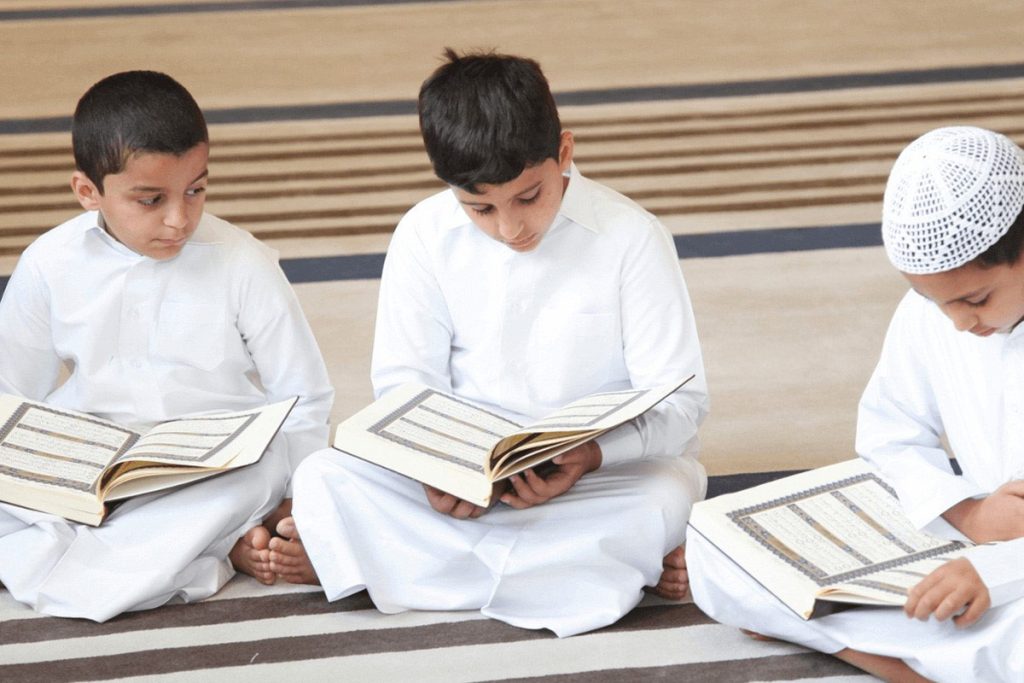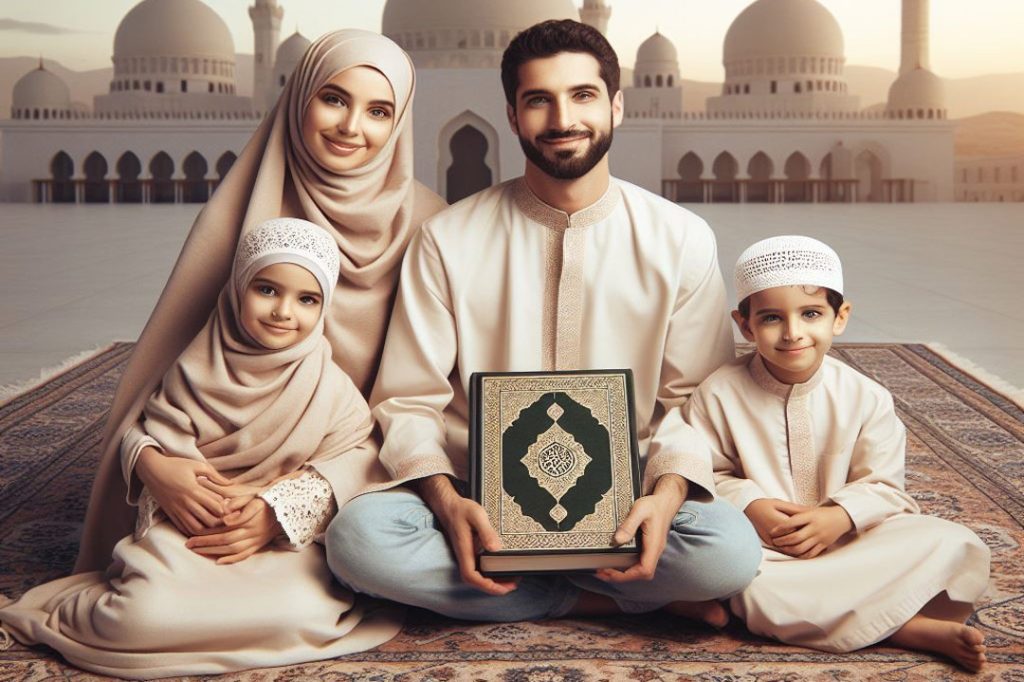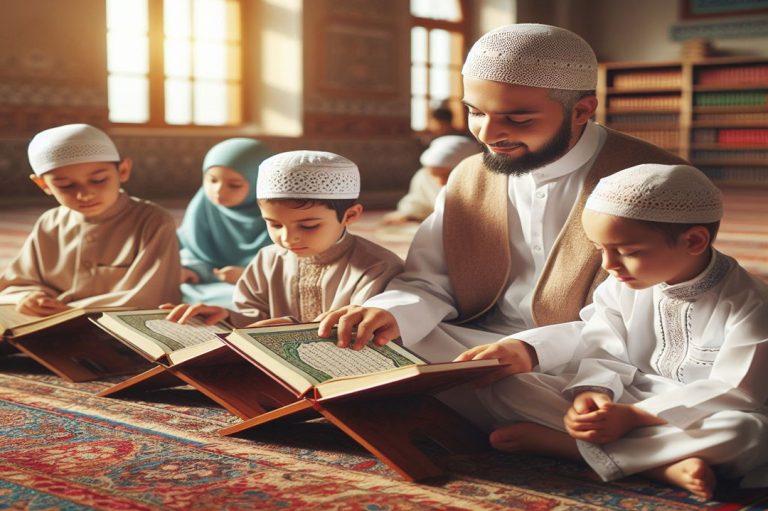“When a Muslim spends something on his family intending to receive Allah’s reward it is regarded as Sadaqa for him.”
Prophet Muhammad (S)
Table of Contents
ToggleFamilies are the foundation of our society and play an essential role in our lives. In the Holy Quran, family is considered to be one of the most important relationships in our lives.
This document will explore the definition of family, the roles and responsibilities within the family, the importance of maintaining family ties, lessons from family stories and examples in the Holy Quran, and the family as a source of comfort and support.
The Definition of Family in the Holy Quran
Families come in all shapes and sizes, but in tafsir of Holy Quran defines a family as a group of individuals connected by blood, marriage, or adoption who share a commitment to each other and the well-being of the family unit.
This definition is broad, inclusive, and reflects the diverse ways that families are formed and maintained in our society.
Roles and Responsibilities within the Family
Parents
The role of parents within the family is one of the most significant aspects of Islamic teachings. In the noble Quran, Allah has laid out specific duties and responsibilities for parents in raising and nurturing their children. As a result, it is crucial for parents to understand and implement these teachings in order to foster a healthy and harmonious family environment.
First and foremost, The sacred Quran emphasizes the importance of providing a nurturing and loving environment for children. In Surah Al-Baqarah, verse 83, Allah says, “And [mention, O Muhammad], when We took the covenant from the Children of Israel, [enjoining upon them], ‘Do not worship except Allah; and to parents do good and to relatives, orphans, and the needy. And speak to people good [words] and establish prayer and give zakah.’ Then you turned away, except a few of you, and you were refusing.”
This verse highlights the duty of parents to treat their children with kindness and compassion, in line with their obligation to Allah. It is essential for parents to create a loving and supportive environment that nurtures the emotional and psychological well-being of their children. Parents should show patience, understanding, and gentleness in their interactions with their children, and provide them with a sense of security and belonging within the family.
Moreover, The sacred Quran also emphasizes the importance of instilling moral and ethical values in children. In Surah Luqman, verse 13, Allah says, “And [mention, O Muhammad], when Luqman said to his son while he was instructing him, ‘O my son, do not associate [anything] with Allah. Indeed, association [with him] is great injustice.'”
This verse highlights the duty of parents to teach their children about faith and moral values. Parents are responsible for instilling in their children a strong sense of Islamic identity and principles.
They must teach their children about the oneness of Allah, the importance of prayer, the value of honesty, kindness, and respect for others. It is essential for parents to educate their children about the teachings of Islam and guide them towards a righteous and ethical life.
Furthermore, the noble Quran emphasizes the importance of providing for the material and educational needs of children. In Surah Al-Baqarah, verse 233, Allah says, “Mothers may breastfeed their children for two complete years for whoever wishes to complete the nursing [period]. Upon the father’s [father’s] duty to their children and their clothing upon the [father’s] means.
No soul shall have a burden laid on it greater than it can bear. No mother shall be treated unjustly on account of her child, nor father on account of his child.
And on the [father’s] heir is a duty like that the father’s [duty]. And if they both desire weaning through mutual consent from both of them and consultation, there is no blame upon either of them.
And if you wish to have your children nursed by a substitute, there is no blame upon you as long as you give payment according to what is acceptable. And fear Allah and know that Allah is seeing it, and know that Allah is seeing of what you do.”
This verse highlights the duty of parents to provide for the material needs of their children, such as food, clothing, and shelter. Parents are also responsible for ensuring that their children receive a proper education and upbringing.
It is essential for parents to work diligently to provide for the financial and educational needs of their children, in accordance with their means and abilities.

Children
One of the fundamental teachings of the noble Quran regarding the roles of children within the family is the requirement to obey and honor their parents. In Surah Al-Isra (17:23), it is stated, “And your Lord has decreed that you not worship except Him, and to parents, good treatment. Whether one or both of them reach old age while with you, say not to them [so much as], ‘uff,’ and do not repel them but speak to them a noble word.” This verse highlights the obligation of children to show kindness and respect towards their parents, regardless of their age or circumstances.
It emphasizes the importance of maintaining a good relationship with parents and treating them with dignity and love.
Moreover, The sacred Quran emphasizes the responsibility of children to be compassionate and supportive towards their parents. In Surah Al-Isra (17:24), it is mentioned, “And lower to them the wing of humility out of mercy and say, ‘My Lord, have mercy upon them as they brought me up [when I was] small.'” This verse underscores the significance of showing mercy and care towards parents, acknowledging the sacrifices they have made in upbringing and nurturing their children. It encourages children to express gratitude and compassion towards their parents and to always be mindful of their needs and well-being.
In addition to obedience and care, the noble Quran also emphasizes the duty of children to seek knowledge and guidance from their parents. In Surah Luqman (31:14), it is stated, “And We have enjoined upon man [care] for his parents.
His mother carried him, [increasing her] in weakness upon weakness, and his weaning is in two years. Be grateful to Me and to your parents; to Me is the [final] destination.” This verse highlights the significance of seeking wisdom and moral guidance from parents, acknowledging their experience and wisdom in navigating life’s challenges.
It emphasizes the need for children to value the advice and counsel of their parents and to seek their input in making important decisions.
Elderly
One of the main roles of the elderly within the family, as mentioned in Quran, is to serve as a source of wisdom and guidance. In Surah Al-Ankabut, verse 15, Allah says, “But if they strive with you to make you associate with Me that of which you have no knowledge, do not obey them but accompany them in [this] world with appropriate kindness.” This verse teaches us that even if the elderly may sometimes have misguided beliefs, they should still be treated with respect and kindness. Their life experiences and knowledge should be valued, and their advice and guidance should be sought in family matters.
Additionally, the noble Quran emphasizes the importance of showing kindness and compassion towards the elderly. In Surah Al-Isra, verse 23, Allah says, “And your Lord has decreed that you not worship except Him, and to parents, good treatment. Whether one or both of them reach old age [while] with you, say not to them [so much as], ‘uff,’ and do not repel them but speak to them a noble word.” This verse highlights the duty of family members, particularly the younger ones, to treat the elderly with utmost respect and care. It is the responsibility of the younger generation to ensure the well-being and comfort of the elderly within the family.
Furthermore, The sacred Quran emphasizes the importance of providing financial and physical support to the elderly. In Surah Al-Baqarah, verse 215, Allah says, “They ask you, [O Muhammad], what they should spend. Say, ‘Whatever you spend of good is [to be] for parents and relatives and orphans and the needy and the traveler.
And whatever you do of good – indeed, Allah is Knowing of it.'” This verse emphasizes the duty of providing for the needs of the elderly, including financial support, healthcare, and physical assistance.
The Importance of Maintaining Strong Family Ties
the noble Quran emphasizes the importance of maintaining strong family ties. Family members should support and care for each other, offering help and protection when needed. Maintaining family ties ensures a sense of belonging, identity, and purpose within the family. It also strengthens our bond with Allah.

Lessons from Family Stories and Examples in the Holy Quran:
| Story | Lesson |
| Story of Adam and Eve | We are all one human family |
| Story of Ibrahim and Ismail | Commitment to Allah and sacrifice |
| Story of Yusuf and his brothers | The power of forgiveness and reconciliation |
| Story of Maryam | Devotion, faith, and perseverance |
The Family as a Source of Comfort and Support
Unconditional love
Unconditional love within the family is an important concept emphasized in Quran.
Quran stresses the significance of love, compassion, and mercy among family members, promoting harmonious and supportive relationships One of the fundamental teachings of Islam is to foster love and care within the family unit.
Quran acknowledges the central role of the family and encourages individuals to maintain strong bonds with their parents, spouses, children, and other relatives. In Surah Al-Isra (17:23-24), Quran emphasizes the importance of kindness and compassion towards parents, stating, “And your Lord has decreed that you not worship except Him, and to parents, good treatment.
Whether one or both of them reach old age [while] with you, say not to them [so much as], ‘uff,’ and do not repel them but speak to them a noble word. And lower to them the wing of humility out of mercy and say, ‘My Lord, have mercy upon them as they brought me up [when I was] small.'”
Emotional support
the noble Quran, as the holy book of Islam, provides guidance for various aspects of life, including the importance of emotional support from family.
While Quran may not specifically mention the term “emotional support,” in tafsir of Quran it emphasizes the significance of family, love, compassion, and mutual support among family members.
Financial support
Family members often provide each other with financial assistance when needed, offering loans or gifts to help them overcome difficult times.
Spiritual support
The sacred Quran emphasizes the significance of family and highlights the importance of spiritual support within the family unit. It encourages believers to establish and maintain strong bonds with their families, providing spiritual guidance and support during times of difficulty.
the noble Quran values the importance of family as an integral part of our lives.
Families play an essential role in shaping our personalities, building our character, and contributing to our physical, emotional, and spiritual well-being.
Through love, support, and commitment, we can strengthen our family ties and create a happier, healthier, and more meaningful life.








